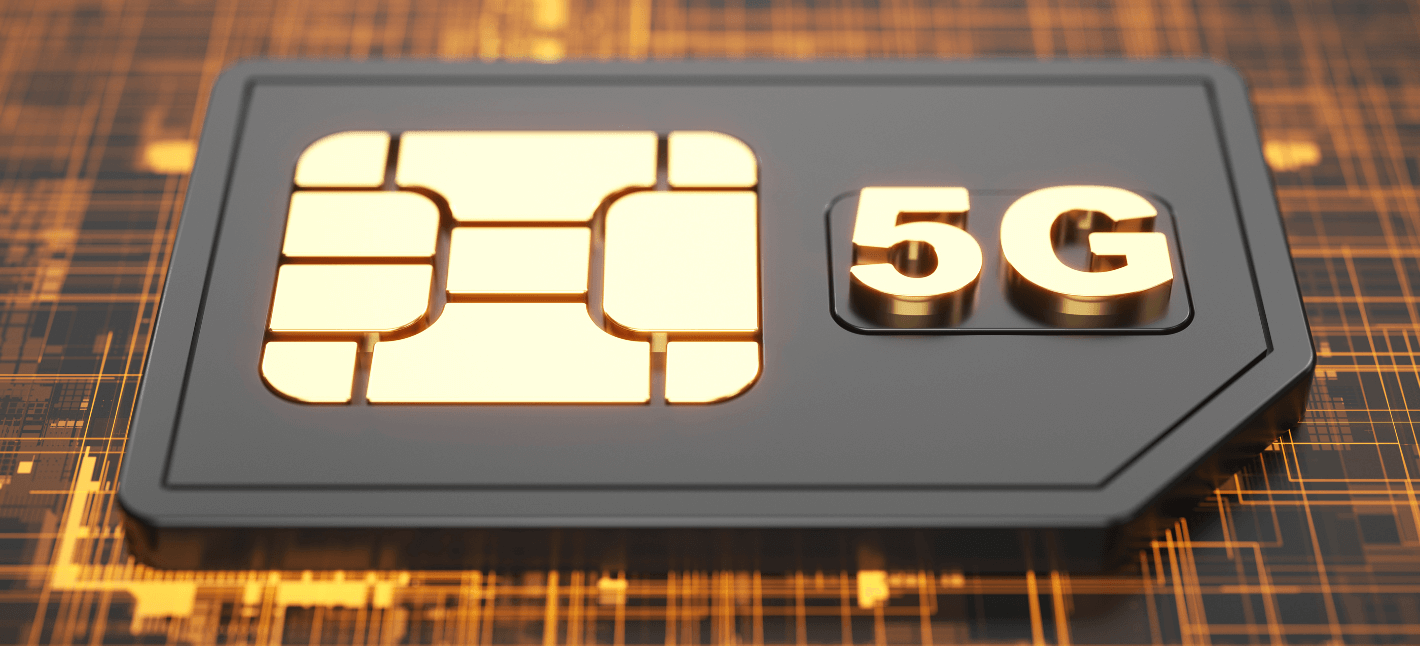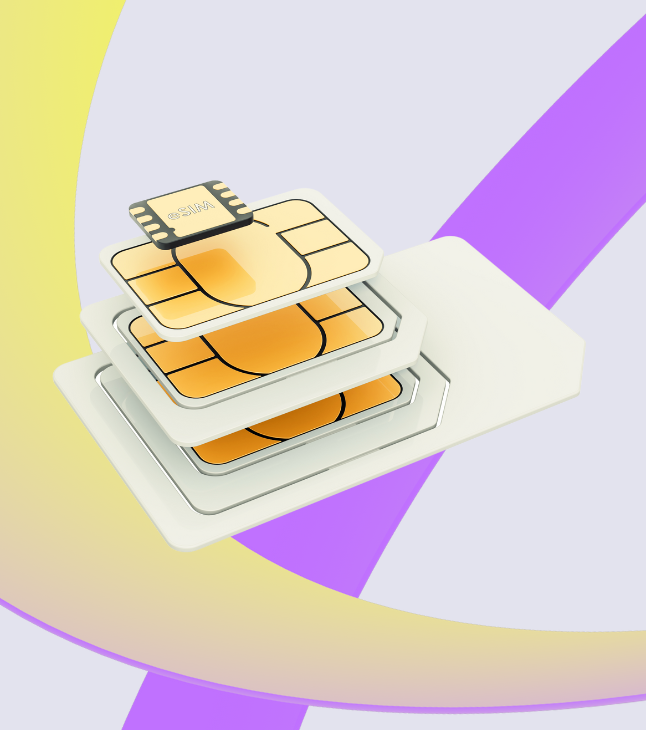What is the difference between IoT and IIoT? What exactly is an IoT SIM card and what are the use cases? These are a few of the most basic questions when it comes to the topic of IoT SIM cards and in this blog post, we want to provide you with the most important answers.
First of all, let’s define the term IoT for you. In addition, it is also important to distinguish what the difference is to the similar-sounding term IIoT.
Introduction to IoT SIM Cards
IoT SIM cards serve the primary need for IoT connectivity. As such, they provide ideal data transfer, bandwidth, and latency for IoT applications. IoT SIM cards also focus on unique provisions such as M2M communication, low-power consumptions, lower data rate, and enough mobility for mobile IoT applications. Read on to learn more about IoT SIM cards, discover their benefits and find out how your business can start using IoT SIM Cards in the UK – or anywhere in the world!
How IoT SIM Cards Work: The Basics of Cellular Connectivity
IoT SIM cards function on the same cellular network infrastructure established by mobile network operators. Cellular network infrastructures for 2G, 3G, 4G, and 5G are the same that support IoT SIM connectivity for networks like LTE-CAT M1 and NB-IoT.
Ideally, for users, registering a SIM card remains the SIM regardless of the use of a physical or embedded SIM card. However, Enterprises must resort to a connectivity management platform and mobile device management in order to manage a wide fleet of devices with IoT SIM cards. Such a platform with IoT SIM cards can help manage, activate, limit, and deactivate the connectivity of any devices remotely.
What is the difference between IoT SIM cards & traditional ones?
IoT SIM cards, as previously said, are designed to connect devices and two machines’ northbound apps. As a result, the automotive, industrial, logistics & telematics, and medical industries are the most common applications for IoT SIM cards. Traditional SIM Cards, on the other hand, are mostly utilized in consumer devices such as smartphones and tablets. However, there isn’t the only distinction between the two sorts of SIM cards. They, on the other hand, differ in the following areas:
- Durability of IoT SIM card
IoT SIM cards, unlike regular SIM cards, are frequently utilized in distant places with tough conditions. IoT SIM cards are engineered to survive more extreme circumstances than standard SIM cards used in consumer devices. Furthermore, IoT SIMs can last for up to ten years.
- Increased storage capacity of IoT SIM card
IoT SIM cards differ from regular SIM cards in that they have a larger memory capacity. IoT devices are frequently installed in remote areas, and a large amount of data is delivered there that cannot be removed on a regular basis.
- Scalability and Roaming Capability on a Global Scale of IoT SIM card
Mobility of the devices and cross-border communication are significant requirements in many IoT and M2M use cases; IoT SIM cards are typically allocated to tariffs with standardized regional cost structures. The only way to successfully power an international and even global-scale network, especially with M2M eSIMs, is to use IoT SIMs and IoT cellular connectivity.
- Security of IoT SIM card
As a result, traffic from M2M connections is frequently segregated from the rest of the data traffic in mobile network carriers’ core networks. Private access points, or APNs, are commonly utilized to do this.
- Management platform for multiple IoT SIM cards
Another significant distinction is that IoT SIM Cards are typically controlled through a platform. This allows you to manage all of your IoT SIMs and end devices from a single location. Learn more about the CMP at Freeeway (Connectivity Management Platform).
- Accounting and Invoicing multiple IoT SIM cards
In contrast to regular SIM cards, special data tariffs are offered for IoT SIMs. In addition, the standard approach of data pooling allows one device’s unused data volume to be passed on to other devices. As a result, the tariff bundles are usually better utilized.
Types of IoT SIM Cards: Physical SIM cards vs eSIMs
IoT SIM cards can be physical SIM cards as well as eSIMs. Both those types of IoT SIM cards can serve various IoT application needs. Physical SIM card applications reduce device costs and also allow manual network change through SIM card swapping.
On the other hand, eSIMs can serve multiple profiles on a single device, but they can not be removed or replaced. While eSIMs present better security and reliability, they are costlier to implement. In comparison, eSIMs are smaller in size, allowing their use in compact devices.
The Benefits of IoT SIM Cards: Improved Reliability, Security, and Efficiency
IoT SIM cards with a connectivity management platform (CMP) can offer an edge over conventional SIM cards as they offer better management, security, and efficiency.
Here are the benefits of IoT SIM cards:
- Easy activation, management, and deactivation of any IoT SIM card remotely.
- Remote diagnosis for any connectivity issues to ensure that devices are always connected.
- Global IoT network partners to ensure that devices always stay connected to the internet.
- IoT SIM cards are more efficient than traditional ones as most IoT applications do not demand as much bandwidth and power consumption as normal mobile device connectivity.
The difference between IoT & IIoT
What is IoT?
To understand what IoT SIM cards are in the first place, it is necessary to explain the term IoT. This is in fact the abbreviation for the term Internet of Things. With the Internet of Things, it is possible for smart devices to connect to each other on the one hand and to the outside world on the other. To make it easier to understand, you can also imagine that through these SIM cards the devices have the ability to talk to each other without involving a human being. This makes it possible for everyday objects to become intelligent devices.
What is IIoT?
IIoT is an abbreviation for the term Industrial internet of things. The IIoT is a subset of the IoT that focuses on industrial applications. Companies can increase the efficiency of their gadgets in their operations as a result of this. Thus, it can be said that IIoT is a subset of IoT and focuses only on industrial purposes.
What is an IoT SIM card?
Once you understand what the term IoT even means, it’s easy to understand what an IoT sim card is.
Unlike traditional sim cards, which we use in devices such as cell phones or tablets, IoT sim cards are designed for smart devices. IoT sim cards allow devices to be connected and able to communicate with each other.
What are the actual use cases for IoT SIM cards?
Whether we know it or not, in our daily lives, we often encounter products powered by M2M SIM cards – e.g., smart wearables, smart home devices, smart sensors, and connected industrial and medical devices. Those products must communicate with each other or, very commonly, cloud-based applications to be fully functional.
In contrast to regular SIM cards, special data tariffs are offered for M2M SIM cards. In addition, the standard approach of data pooling allows one device’s unused data volume to be passed on to other devices. As a result, the tariff bundles are usually better utilized.
Using IoT SIM Cards in the UK and Globally
When it comes to deploying IoT devices both in the UK and on a global scale, the role of IoT SIM cards becomes paramount.
Specialized IoT SIMs are not only tailored to meet the unique connectivity requirements of the UK market but also provide a versatile solution for international IoT deployments. For businesses and organizations looking to expand their IoT footprint beyond national borders, IoT SIM cards designed for global use offer seamless connectivity in multiple countries, eliminating the need for managing different SIMs or contracts. This global compatibility ensures that IoT devices can maintain connectivity and transmit data reliably, regardless of their location. As IoT continues to drive digital transformation across industries, the flexibility and scalability provided by IoT SIMs make them an indispensable asset for businesses seeking to harness the power of the Internet of Things on both local and global scales.
Choosing the Right IoT SIM Card: Key Factors to Consider
Here are several factors to be considered when choosing an IoT SIM card and your IoT connectivity partner:
- IoT Network Coverage:
Ensure that the provider offers extensive network coverage in the areas where your IoT devices will be deployed. Whether you will be registering your IoT SIMs for use in the UK, or anywhere else in the world: Robust coverage is crucial for reliable connectivity and communication. - IoT Connectivity Options:
Evaluate the connectivity options provided by the SIM card provider. They may support different network technologies such as 2G, 3G, 4G, 5G, LTE, and even emerging technologies like NB-IoT or Cat-M1. Choose a provider that aligns with your specific IoT application requirements.
- Scalability of your IoT Connectivity Partner:
Consider the scalability of the provider’s offerings. If you plan to deploy many IoT devices, ensure the provider can accommodate your scaling needs and offer flexible pricing plans that suit your growth. - IoT Data Plans and Pricing:
Assess the data plans and pricing options provided by the SIM card provider. Look for plans that align with your expected data usage and budget. Consider factors such as data limits, coverage charges, and any additional fees or discounts. - IoT SIM Management Platform:
Evaluate the SIM management platform provided by the provider. A robust platform should offer features such as remote IoT SIM card activation, deactivation, real-time monitoring, usage tracking, and managing multiple IoT SIMs efficiently. - Security of connected devices:
IoT devices often handle sensitive data, so security is paramount. Assess the security measures offered by the provider, such as encrypted data transmission, secure authentication protocols, and network-level security features to protect your IoT ecosystem from cyber threats. - Customer Support from IoT experts:
Consider the quality and responsiveness of the provider’s customer support. Prompt assistance and technical support can be crucial in resolving any issues or addressing connectivity challenges that may arise. - IoT Roaming Capability:
If your IoT devices will operate in multiple regions or countries, check if the provider offers reliable roaming capabilities. Seamless connectivity during roaming ensures uninterrupted communication for your devices. - Integration and APIs:
If you require integration with your existing systems or platforms, verify if the provider offers APIs (Application Programming Interfaces) or integration options that enable smooth integration with your IoT infrastructure. - Branding of your IoT SIMs & white label options:
Often, device manufacturers urge to white label IoT SIMs to further promote their branding. It is important to verify if your IoT SIM card supports such requests. - Customized plan for IoT SIM cards: Make sure you pay for the connectivity per your IoT application. Often IoT applications do not need a high data transfer rate, bandwidth, or capacity. Choosing the perfect plan can cut down costs.
- Pool pricing: Are you paying for a flexible pool or a fixed pool? Which one will better serve your application? According to the needed flexibility, one can choose the right IoT SIM card connectivity.
Considering these key factors will help you select the right IoT SIM card provider that can meet your specific connectivity needs, offer reliable service, and support the growth and scalability of your IoT deployments.
Registering your IoT SIM Card in the UK or Wherever You Need It
Global Network Partners supporting IoT SIMs
From a single country to global network coverage, co-operates with leading Mobile Network Providers to provide you with access to over 680 networks throughout the world. Take a peek at our current partners, but stay tuned because we’re always expanding!
KPN is a Dutch landline and mobile telecommunications company based in Rotterdam, Netherlands. Freeeway offers access to 461 networks and provides services for 2G, 3G, 4G, 5G, LTE and LTE CatM1.
A1 Telekom Austria is the leading communication provider in Austria based in Vienna. Through the provider network, Freeeway connects to 406 networks for 2G, 3G, 4G, 5G, LTE and NB-IoT.
Magenta is an Austrian-based telecommunications provider and a fully subsidiary of Deutsche Telekom AG (Germany). The partnership enables Freeeway to offer 524 networks for 2G, 3G, 4G, 5G and LTE-M, LTE CatM1, NB IoT.
Vodafone is a global leader in technology communications based in Newbury, UK. As an official Vodafone partner, Freeeway offers access to 680 networks for 2G, 3G, 4G, LTE-M, LTE CatM1 and NB-IoT. Register your IoT SIM Card in the UK with Vodaphone Business.
Arquia Datora is our first network partner in South America, based in Sao Paolo, Brazil. Through this partnership, freeeway is able to offer 2G, 3G, 4G and LTE in Brazil through TIM and VIVO networks.
Telna provides Freeeway with a managed global network infrastructure for cellular connectivity. Its multi-network platform enables simplified billing and localization, utilizing 6+ telco pops globally.
TELUS is a dynamic, world-leading communications and information technology company with 15.2 million customer connections spanning wireless, data, IP, voice, television, entertainment, video and security, healthcare, and agriculture.
floLIVE offers advanced 5G network solutions, both privately and over the cloud, and a full suite of global cellular connectivity services for IoT use cases. floLIVE operates floNET – a one-of-a-kind Global Connectivity Service designed and built especially for IoT. With floNET, enterprises can enjoy seamless global connectivity for their connected devices.
Our Data Plans & Pooling Options
At freeeway, we offer two pricing and two pooling options to provide you with the right IoT SIM Card for the UK or wherever in the world connectivity is required.
Pricing Options:
- Postpaid IoT SIM card
At the end of the billing cycle (usually aligned with the calendar month), the consumed data volume and SMS are charged. In addition, the invoice highlights the different data bundles, SMS and M2M voice consumption, and out-of-plan fees.
- Prepaid IoT SIM card
Optionally you can select a prepaid model that provides a per price-plan level, an MB data bundle, and a validity period, e.g., 500MB for 24 months.
Pooling Options:
- Static Pool
Where a certain number of data, i.e. 500GB, is provided monthly. An infinite number of SIM cards can be assigned to the static pool and consumed from there. After the pool is consumed, you have the option that another pool of the same size is opened or that a second smaller pool, i.e., 50GB is added for this billing cycle. The system will start again in the following billing cycle with a static 500GB pool.
- Flex Pool
A Flex pool allows you to use the data allowance of multiple SIM cards within a price plan. With every additional activated SIM card, the overall pool for you increases. The price plan includes a data allowance per SIM and an over-usage rate per zone. In case the data allowance is used up, the SIM card is NOT deactivated.
Price plans can be changed at any time during the month. The price plan set on the last day of the billing cycle (month) will be charged.
The technical details of our IoT SIM cards
We provide you with all possible M2M SIM card formats:
- Form Factors
All SIM form factors are available: 2FF (Macro), 3FF (Micro) & 4FF (Nano) as well as MFF2 (SIM Chipsets)
→ You can read more about IoT SIM form factors here
- Branding
Two visual IoT SIM card options. Customized with your company branding if needed or plain white.
- Industry Grade
Special industrial-grade IoT SIMs with more read/write cycles as well as higher/lower temperature ranges (-40 up to 85 or 105 degrees celsius).
- MFF2
Format for industrial assembly. MFF2 SIM cards are SMD (= Surface Mount Devices) units. Hence, the IoT SIM is like any other active or passive electronic component that will be added during manufacturing. These IoT SIMs are usually more durable than normal plastic cards and have their main applications in appliances that work in harsh conditions.
- Customized Solutions
We offer special solutions for aviation, automotive, and your use case. Ask how we can help you!
Benefits of IoT SIM Cards for UK-based Businesses
In the United Kingdom, the adoption of the Internet of Things (IoT) has been steadily increasing across various industries, from smart cities and utilities to logistics and healthcare. This surge in IoT deployment has driven the demand for specialized connectivity solutions, and IoT SIM cards tailored for the UK market have become essential components of IoT ecosystems.
An IoT SIM card for the UK is specifically designed to address the unique connectivity needs of devices operating within the country. IoT SIMs are equipped to provide reliable and secure cellular connectivity to IoT devices, ensuring seamless communication and data exchange. They are optimized for use with IoT protocols and technologies, such as Narrowband IoT (NB-IoT) and LTE-M, which are well-suited for applications like smart meters, asset tracking, and remote monitoring.
One of the key advantages of using an IoT SIM card in the UK is the ability to leverage the extensive coverage and robust network infrastructure offered by local cellular providers. IoT SIMs are typically available with flexible data plans that cater to the diverse data consumption patterns of IoT devices. Whether you require low-data, high-data, or custom-tailored plans, IoT SIM cards in the UK can be configured to meet your specific connectivity needs.
Furthermore, IoT SIM cards for the UK come with advanced management and control features, allowing businesses to monitor data usage, remotely activate or deactivate SIMs, and ensure the security of their IoT networks. This level of control is crucial for managing large-scale IoT deployments efficiently and cost-effectively. As the IoT ecosystem in the UK continues to expand, businesses and organizations are recognizing the value of dedicated IoT SIMs to enable their devices to connect, communicate, and deliver data-driven insights effectively.
Get to test our IoT SIM card for your smart devices
There’s much more to IoT SIM cards, as they remain a prevalent connectivity solution for IoT applications. Reach out to us today to learn more about IoT SIMs and the ideal solution for your connectivity requirements.
Your form entry has been saved and a unique link has been created which you can access to resume this form.
Enter your email address to receive the link via email. Alternatively, you can copy and save the link below.
Please note, this link should not be shared and will expire in 30 days, afterwards your form entry will be deleted.




